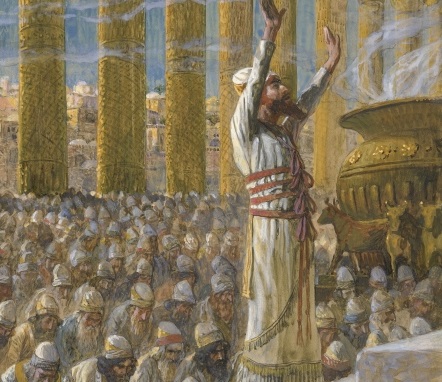
In this chapter, the psalmist pleads with the gates to open up:
שְׂאוּ שְׁעָרִים רָאשֵׁיכֶם, וְהִנָּשְׂאוּ פִּתְחֵי עוֹלָם;
וְיָבוֹא מֶלֶךְ הַכָּבוֹד.
מִי זֶה מֶלֶךְ הַכָּבוֹד?
ה’ עִזּוּז וְגִבּוֹר, ה’ גִּבּוֹר מִלְחָמָה.
שְׂאוּ שְׁעָרִים רָאשֵׁיכֶם, וּשְׂאוּ פִּתְחֵי עוֹלָם,
וְיָבֹא מֶלֶךְ הַכָּבוֹד.
מִי הוּא זֶה, מֶלֶךְ הַכָּבוֹד?
ה’ צְבָאוֹת — הוּא מֶלֶךְ הַכָּבוֹד סֶלָה.
(תהילים כ"ד:ז-י)
“Lift up your heads, O gates; and let the entrances of the world be uplifted, so the King of glory may enter.
Who is this King of glory? God, strong and mighty; God, mighty in battle.
Lift up your heads, gates; lift up, entrances of the world, so the King of glory may enter.
Who is He, this King of glory? The Lord of Hosts, He is the King of glory.” (Psalm 24:7-10)
What exactly are these gates that refuse to open? Why does the psalm describe God first as a mighty Warrior in battle and later as the “Lord of Hosts”?
The Talmud writes that these were the prayers of King Solomon as he pleaded with the Temple gates. After completing the construction of the Temple in Jerusalem, the final step was to bring the Holy Ark into the Holy of Holies. But the gates refused to open!
Why did the Temple gates disobey Solomon?
Disconnect Between Mind and Heart
According to Rav Kook, Solomon’s difficulty placing the Ark inside the Temple was a sign that the Jewish nation was not ready for the Temple and its spiritual influence on the entire world.
Divine service is based on those human faculties through which the human soul receives the Divine light. The Temple service — like prayer — primarily engages our faculties of emotions and imagination.
But these faculties must be governed by the intellect. Thus, completing the Temple meant placing the Ark — which contained the luchot and the scrolls of the Torah, the source of enlightenment for the world — in the innermost chamber.
Those who have not refined their character traits suffer from a dissonance between their intellectual recognition and their desires. While they know the correct path, their hearts and desires are not under the intellect’s control. This disparity, if not corrected, will eventually lead to a spiritual lapse of great magnitude.
This phenomenon of dissonance can also exist on the national level. The people in the time of Solomon were not on a sufficiently high spiritual and moral level. Their spiritual attainments were temporary. In the depths of their souls, the seeds of corruption that would later bring about the Temple’s destruction were already planted.
The Temple gates’ refusal to accept the Ark is a metaphor for this lack of spiritual readiness. The people’s inner emotions were not pure, and they had failed to fully establish their intellectual level. They had not clarified the path that could guide their hearts and desires.
King Solomon’s Solution
When King Solomon sought to bring the Ark and the Temple together, he was searching for a method to unite the minds and hearts of the nation.
Generally speaking, the intellect seeks to benefit all peoples, without differentiating between nationalities. It is the heart that feels an attachment to one’s people and seeks to promote its success in particular.
With regard to the Jewish people, however, there is no conflict between these two aspirations. Respect accorded to the Jewish people leads to universal recognition of monotheism and the ideals of the Torah; the entire world benefits from this enlightenment.
Solomon turned to the Temple gates, guarding over the national interests of the Jewish people: “Lift up your heads!” Open up, and let God enter!
When the gates of Jerusalem open up, the “entrances of the entire world” will also open. The heart, full of love and concern for the Jewish people, will then complement the intellect, which aspires to elevate the entire world.
Two Paths to Elevate the Nations
The Temple is a source of universal enlightenment, a “house of prayer for all the nations” (Isaiah 56:7). There are two paths in which Israel can influence the world; King Solomon alluded to both in his prayer.
At a time when there are many forces in the world opposing the Jewish people and the Torah, we can nonetheless identify an overall progress towards the ultimate goal. One factor in this advance is recognition of God’s protection of His people over the millennia. The unique story of a people surviving (and outlasting) many powerful empires who sought to subjugate and destroy it demonstrates formidable Divine providence in the history of the world.
Not only did Israel survive, but often vanquished other nations, enabling other nations to recognize the nobility of its Torah and holy ideals. The survival of the Jewish people throughout centuries of persecution reflects the Divine attribute of gevurah, strength and might. Solomon referred to this aspect when he described God as “mighty in battle.”
There exists a second, gentler method by which Israel influences the world. Not in the loud blaring of battle, but in the “still, small voice.” Gradually, without fanfare, holiness spreads from the enlightened source of Israel. The “entrances of the world” are not forcibly opened by the gates of Jerusalem. They lift themselves up: “Let the entrances of the world be uplifted.”
Each nation will rise to the higher goal, but its truth will correspond to its own predisposition. The ethical hues will be numerous and varied, as each nation accepts the imprint of Godly ideals based on its natural tendencies.
In this second path, God is revealed as “the Lord of Hosts,” the God of many diverse peoples. Each nation strives towards its own particular goal, and together they unite towards the one universal goal, in accordance with their Creator’s will.
(Adapted from Ein Eyah vol. III, pp. 83-85, on Shabbat 30)
Illustration image: ‘Solomon Dedicates the Temple at Jerusalem’ (James Tissot, 1836-1902)





